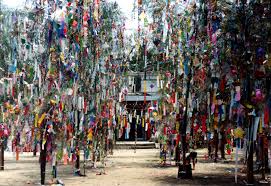Some time ago I made a presentation about Japanese Valentine’s Day. In most countries people give various kinds of presents to their special person or share fine dining on the day. On the contrary, in Japan the meaning of Valentine’s Day differs, that is, girls give chocolates to boys to show their affection. Not accessories, flowers or meals, the present are only chocolates. Though maybe this trend has been spreading since 50 years ago, these days other new trends are coming up. In other words, girls give chocolates not only to one special boy but also other people, for example her colleagues, bosses, family members, and even her female friends. And I was surprised when I heard these days even boys give chocolates to their friends. But in my opinion, teenagers especially like this event. In the class room almost all girls bring sweets, so also I had to do the same thing when I was in high school. And what is interesting is they try to make chocolate sweets by themselves. Though it was really tough for me to make more than 50 sweets before that day, I felt it was my duty.
The process of making my presentation reminded me of my previous experiences. I thought about Japanese culture and noticed it’s strange Japan has soooo many rituals. To some degree, they feel like it’s a duty or necessity, I think I want you to know some popular ones.
These are:
On 1st Jan (New Years Day), eating Osechi and Zouni (traditional meal), visiting a shrine, receiving New Year cards, and giving children pocket money.
On 7th Jan, eating Nanakusagayu (rice porridge with 7 kinds of weeds) to refresh our stomachs.
On 10th Jan (Seizinshiki, means celebrating people who are 20 years old), wearing Kimono (traditional clothes), and holding assemblies.
On 3rd Feb (Setsubun, means the day before the beginning of spring), throwing soybeans to get rid of evil spirits, eating a big sushi roll while facing a specific direction without talking, and eating Iwashi (a kind of fish).


On 14th Feb (Valentine’s Day), and giving chocolates to a special boy.
On 3rd March (Hinamatsuri, means celebrating growth of girls), displaying traditional dolls (usually there are 15 dolls), eating Hishimochi (rice cake in square form) or Sakuramochi (pink rice cake wrapped in a cherry leaf).


On 14th March (White Day), returning some gifts to the girl who gave a chocolate on Valentine’s Day.
On 5th May (Kodomonohi, means celebrating growth of boys), displaying big fish-like balloons, displaying traditional warrior’s helmet, eating Chimaki or Kashiwamochi (both are kinds of rice cake).


On the second Sunday in May (Mothers’ Day), thanking your mother, giving them carnations.
On the second Sunday in June (Fathers’ Day), thanking your father.
On 7th Jun (Tanabata,the Star Festival), hanging a colourful paper on which you write your wish on a bamboo stalk, holding festivals, and seeing stars (but this is in the rainy season so we can rarely see them).

On average 15th Aug (the Bon festival, Festival of the Dead),visiting funerals of ancestors and giving flowers or food.
On 15th Sep (Tukimi, Moon festival), seeing the full moon, and eating rice cakes.
On 31st Aug (Halloween),enjoying wearing various kinds of costumes, and having parties (maybe different from the Western type).

On 15th Nov (Shichigosan, means celebrating children who are 3, 5, 7 years old), wearing Kimono (traditional clothes), visiting a shrine with your family, and taking photos.

On 25th Dec (Christmas Day), eating cakes, having parties, and giving presents.

On 31st Dec, cleaning all around your house, eating Toshikoshisoba (soba noodles to welcome the new year).
Other than these, there are more rituals in Japan like cherry blossom festivals, summer festivals, seeing autumn leaves and many more!!

Again I realise how Japanese like having events, especially eating seasonal food ( in most events above people have some kind of special meal!!) I discovered some reasons for this tendency; 1.Japanese like sharing time with others. 2.Especially these days many commercials have been spreading and Japanese people are affected easily. 3. Traditionally Japan has been influenced by various cultures and absorbed them. 4. Japan has many seasons. 5. Japanese cherish their culture.
They can be heard as good points and also as bad points, but anyway those are our customs. I’ll enjoy them.
Kaho, Upper-Intermediate











